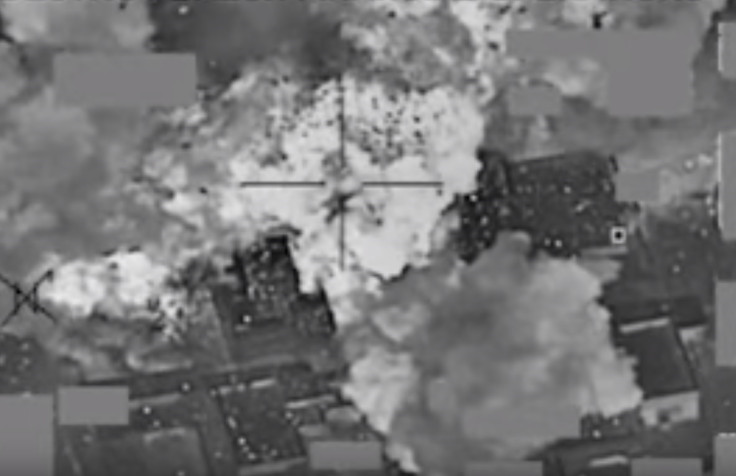War on Isis: Millions of dollars blown up in the air after coalition blasts Daesh bank

The US Defence Department have released a video of millions of dollars of cash used by Islamic State (Isis) being blown into the air in what they describe as a "good strike". The newly-declassified video shows an air strike against an Isis (Daesh) cash depot in Mosul, Iraq, on 11 January.
The 47-second video shows a pair of 2,000lb (907kg) bombs strike a cluster of buildings leaving cash bills scattered across the pavement and nearby rooftops. Mosul is the main stronghold of IS in Iraq and second only to Raqqa, in Syria, as the most important city in the extremists' fiefdom.
The coalition, including the UK, France, the US and other nations, has been targeting IS oil fields in Operation Inherent Resolve to stem the flow of cash to the terror group which could be funding attacks in the West, to those seen in Paris. Estimations suggest that IS earns an estimated £315m ($450m) a year from selling oil produced in Iraq and Syria on the black market.
"It was a good strike. And we estimate that it served to deprive Isil [IS] of millions of dollars," said General Lloyd Austin, head of the US Central Command, to CNN. "Combined with all of the other strikes that we've done on ISIL's gas and oil production and distribution capabilities and strikes against his economic infrastructure and the various sources of revenue, you can bet that (it) is feeling the strain on his checkbook."
The aerial footage is said to be that of the al-Zuhour bank in an eastern district of Mosul. Iraq's finance minister said in 2015 that IS had looted nearly half a billion dollars from banks in Mosul, Tikrit and Baiji since they took over the land.
IS also receives cash by selling plundered antiquities from several historic sites in Palmyra in Syria and Nimrud in Iraq. The artefacts are sometimes destroyed as a form of cultural cleansing or sold in neighbouring countries, such as Turkey.
The terror group also takes money from the citizens living under their rule on the form of a zakat tax, which is a form of almsgiving in Islam. Zakat requires Muslims to hand over a portion of their income and IS are believed to use the cash to help launch foreign attacks.
US: Bombing banks is OK ! https://t.co/68R4uOKqJC
— Marco Saba (@marcosabait) January 14, 2016IS also takes 2.5% of capital from wealthy residents and businesses, 5% of irrigated crops and 10% of rain-fed crops from farmers, according to the Financial Times. Speaking at a news conference in Florida on Thursday, 14 January, General Austin said IS may increase attacks around the globe after losing ground recently in the Middle East.
"Isil [IS] needs those funds to pay their fighters, to recruit new fighters and to conduct their various maligned activities," Austin said. "We said from the outset of this campaign that to defeat Isil, we're going to have to take away its ability to resource itself."
© Copyright IBTimes 2025. All rights reserved.






















